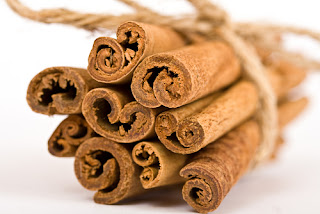Cinnamon is the bark of the cinnamon tree from the genus Cinnamomum, which is most widely seen in South India, Sri Lanka, South East Asia, Southern China, Madagascar etc. It is a spice widely used in sweet and savory foods as a condiment and to give them a flavor and traditionally used as a medicine. It is also used as an insect repellant and for preserving and pickling of foods. Cinnamon is made by drying the bark of the cinnamon tree. It is available as sticks, quills which are rolls of the bark of tree. It can also be ground into a powder. It has a fragrant, sweet, and warm taste.
Picture credit: greenparenthood.com
The flavor of the cinnamon is due to the aromatic essential oil, 0.5% to 1% which is present in the cinnamon bark. The chemical composition of cinnamon bark includes compounds such as cinnamaldehyde, cinnamyl acetate, cinnamyl alcohol, ethyl cinnamate, eugenol, beta-caryophyllene, linalool, methyl chavicol and other volatile substances.
Picture credit: kgstiles.com
Beneficial Properties of Cinnamon
1. The extracts of cinnamon bark is effective against HIV-1.
2. Cinnamon compounds are effective against bacteria and
funguses, which causes yeast infections, thrush, and stomach ulcers. It is a
powerful antibiotic.
3. Eugenol extracted from the cinnamon leaves have antiviral
properties, which is directed against HSV-1 and HSV-1 viruses.
4. Cinnamon has regulatory effects on blood sugar. It has
beneficial results in people suffering from type 2 diabetes.
5. The compounds such as terpenoids contained in the
cinnamon has powerful antiviral properties.
6. Cinnamonaldehyde prevents colorectal carcinogenesis. It
is also found to reduce the proliferation of leukemia and lymphoma cells.
7. It prevents platelet clumbing in blood and exhibits
anti-clotting effect on blood.
8. It inhibit the release of arachdonic acid from the cell
membrane and posses antiinflammatory effect.
9. It gives significant relief for patient suffering from
arthritis.
10. Cinnamon contains polyphenols and antioxidants
that create healthier arteries and reduce the risk of cardiovascular disease.
11. Cinnamon is an excellent source of some vitamins and the essential mineral
manganese and a source of dietary fiber, iron, and calcium. The fiber and calcium binds with the
bile salts and reduces the risk for colon cancers.
12. It is a food preservative and when added to the food
products, it inhibits the growth of bacteria and it is a natural food
preservative.
13. It is used in relieving toothache. A mixture of cinnamon and honey is applied to the tooth till the pain is relieved.
14. It has
been used for digestive ailments in traditional medicine to prevent
indigestion, gas, bloating, stomach upset, and diarrhea.
Cinnamon over dose hazards.
1. Coumarin found in the cinnamon can damage the liver, it
has a blood thinning effect so it is contraindicated in patients with liver
disease.
2. Cinnamon oil is highly potent and so any overdose can
depress the central nervous system.
3. Use of cinnamon when taking regular medicines must be
avoided because it will have an additive effect on some drugs.
Cinnamon overdose must be avoided.


Nice blog Benefits of cinnamon and keep share more information.
ReplyDeleteVery informative blog and read the full Benefits of cinnamon and keep share more information.
ReplyDelete